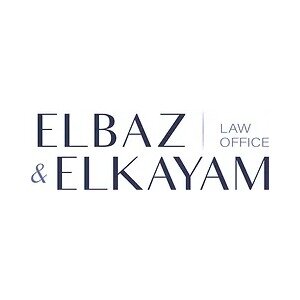Best Conveyancing Lawyers in Israel
Share your needs with us, get contacted by law firms.
Free. Takes 2 min.
Free Guide to Hiring a Real Estate Lawyer
Or refine your search by selecting a city:
List of the best lawyers in Israel
About Conveyancing Law in Israel
Conveyancing in Israel refers to the legal process of transferring ownership of real estate property from one party to another. This process involves transferring land titles, ensuring all legal requirements are met, and registering the new ownership with the appropriate Israeli authorities. The real estate market in Israel is regulated and closely monitored, making the conveyancing process detailed and sometimes complex. Every stage requires compliance with local laws, including zoning, land registration, and taxation regulations.
Why You May Need a Lawyer
Engaging a lawyer is an essential part of the property buying or selling process in Israel. Property laws can be intricate, and the documents involved are often written in Hebrew with legal terminology that can be challenging to understand for non-experts. Common situations where a lawyer is crucial include:
- Drafting or reviewing sale and purchase agreements
- Conducting due diligence on the property
- Investigating potential legal issues or outstanding obligations on the property
- Negotiating terms or resolving disputes between parties
- Handling registration with the Israel Land Registry (Tabu), Israel Land Authority, or housing companies
- Managing payments, taxes, and securing mortgages or financing
- Assisting foreigners or non-residents in navigating regulations that may be new to them
Local Laws Overview
Israel's conveyancing laws are based on several legal frameworks, mainly the Land Law of 1969 and related legislation governing property transfer, taxation, and registration. Key aspects include:
- Land Registration: Properties must be registered in one of three main registries: the Land Registry (Tabu), the Israel Land Authority (ILA), or housing companies (Amidar, Amigur, others).
- Title Investigation: Buyers must confirm clear title, absence of liens or debts, correct boundaries, and planning compliance.
- Contracts: Real estate transactions require written contracts, with specific terms outlining payment schedules, obligations, timelines, and penalties.
- Taxes: Both buyers and sellers face taxes. Common taxes include Acquisition Tax (Mas Rechisha), Capital Gains Tax (Mas Shevach), and occasionally VAT.
- Mortgages: Many transactions involve obtaining and registering a mortgage, which creates additional legal steps.
- Powers of Attorney: When buyers or sellers cannot be present, powers of attorney must be properly prepared and notarized, sometimes with apostille legalization.
Frequently Asked Questions
What documents are required to buy or sell property in Israel?
Generally, you will need identification, land registry extract (nesach tabu), property tax clearance, sale agreement, mortgage documents if applicable, receipts for payment of taxes, and possibly an appraisal report.
How long does the conveyancing process take?
The process can take from several weeks to several months, depending on the parties' readiness, the complexity of the deal, mortgage arrangements, and registration backlog.
Can foreigners buy real estate in Israel?
Yes, foreigners may purchase real estate in Israel, but there are additional procedural and regulatory steps, such as reporting to authorities and obtaining permission in some areas. Special rules can apply to purchases from the Israel Land Authority.
Are there risks in buying properties from developers or secondhand owners?
Yes. With developers, risks include construction delays and completion issues. With secondhand properties, issues may involve debts, hidden defects, or registration problems. Legal advice reduces these risks.
What is the role of the Israel Land Authority (ILA)?
Much of Israel's land is owned by the ILA, not by individuals. Purchasers often receive leasehold rights rather than outright ownership. ILA consent and procedures are required when properties under its jurisdiction are bought or sold.
What taxes are involved in property transactions?
Buyers pay Acquisition Tax, while sellers may be liable for Capital Gains Tax. Exemptions or reduced rates may apply in certain cases, such as the sale of a primary residence, subject to legal criteria.
Do I need a lawyer if I am only buying a small apartment?
Yes, legal pitfalls can occur regardless of property size. A lawyer ensures title, resolves registration issues, drafts contracts, and oversees the payment process, protecting your interests.
How are payments typically handled during conveyancing?
Payments are usually made in several installments tied to certain milestones, such as signing, obtaining loan funds, and final registration. Lawyers commonly hold funds in escrow until completion.
What is “Tabu” and why is it important?
Tabu is the Land Registry managed by the Ministry of Justice. Properly registering a transaction in Tabu is crucial for full legal ownership and ability to resell or mortgage the property.
Can I use an overseas power of attorney?
Yes, but it must be notarized and sometimes legalized with an apostille. It is important to ensure it is recognized by Israeli authorities to avoid delays.
Additional Resources
For further assistance or information on conveyancing in Israel, the following resources are helpful:
- Israel Bar Association: Offers legal guidance and lawyer referrals for real estate transactions.
- Ministry of Justice - Land Registry (Tabu): Responsible for recording transactions and providing official extracts.
- Israel Land Authority (ILA): Manages state-owned land transactions and leases.
- Tax Authority of Israel: Provides guidelines on property taxes, rates, and exemptions.
- Municipal Offices: Can help with property tax clearances and planning permissions.
Next Steps
If you require legal assistance for conveyancing in Israel, start by gathering all relevant documents: identification, property records, prior agreements, and any correspondence with sellers, developers, or authorities. Look for a lawyer experienced in Israeli real estate law, preferably one familiar with your type of property, location, and personal background (for example, if you are a foreign buyer). Arrange an initial consultation to review your case and understand the expected costs, taxes, and timeframe. A qualified lawyer will guide you through every step, help manage risks, and ensure your interests are fully protected.
Lawzana helps you find the best lawyers and law firms in Israel through a curated and pre-screened list of qualified legal professionals. Our platform offers rankings and detailed profiles of attorneys and law firms, allowing you to compare based on practice areas, including Conveyancing, experience, and client feedback.
Each profile includes a description of the firm's areas of practice, client reviews, team members and partners, year of establishment, spoken languages, office locations, contact information, social media presence, and any published articles or resources. Most firms on our platform speak English and are experienced in both local and international legal matters.
Get a quote from top-rated law firms in Israel — quickly, securely, and without unnecessary hassle.
Disclaimer:
The information provided on this page is for general informational purposes only and does not constitute legal advice. While we strive to ensure the accuracy and relevance of the content, legal information may change over time, and interpretations of the law can vary. You should always consult with a qualified legal professional for advice specific to your situation.
We disclaim all liability for actions taken or not taken based on the content of this page. If you believe any information is incorrect or outdated, please contact us, and we will review and update it where appropriate.
Browse conveyancing law firms by city in Israel
Refine your search by selecting a city.














